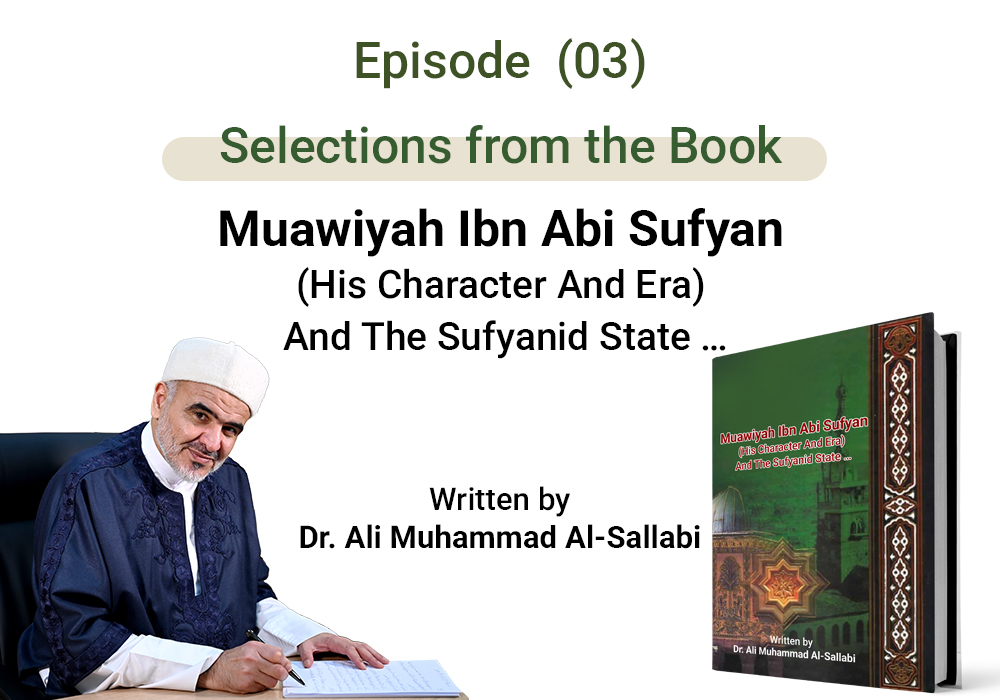The Umayyads’ position on the Islamic call
Selections from the Book Muawiyah Ibn Abi Sufyan (His Character And Era) And The Sufyanid State …
Written by Dr. Ali Muhammad al-Sallabi...
Episode (01)
The Umayyads’ response to the emerging Islamic call was similar to that of other Qurayshi clans, such as family of Makhzum, the Hashemites, and others. For example, let us consider how the Hashemites—the clan of the Prophet (peace and blessings be upon him) and the closest of Quraysh to him—responded to the call. The dominant tribal logic of the pre-Islamic era would suggest that the Hashemites would embrace this new message, which brought them honor and pride through faith and support, and that they would stand behind the Hashemite Prophet (peace and blessings be upon him) with full backing and sacrifice.
Indeed, they did support him in certain instances—the most well-known being when the disbelievers imposed a boycott on them in the Valley of the Hashemites. However, in a broader view, they were divided: some supported him, while others opposed him; some believed, and some disbelieved—just like other clans of Mecca.
The most well-known example of a disbeliever from the Hashemites is Abu Lahab, the Prophet’s (peace and blessings be upon him) uncle, who was the first to openly declare hostility toward Islam when the Prophet proclaimed his message. He did not stop at open opposition but reinforced it through action and plotting. He practiced various forms of harm against the Prophet (peace and blessings be upon him) and tried to turn people away from him. His wife, Umm Jamil bint Harb of the Umayyad clan, aided him in this, along with their two sons, Utbah and Utaibah, who divorced the Prophet’s daughters, Ruqayyah and Umm Kulthum, in an attempt to distract him with grief over his daughters.
His son Utbah even participated in harming the Prophet (peace and blessings be upon him) to the extent that the Prophet prayed against him, and later a lion killed him during one of his travels. Abu Lahab himself refused to enter the Valley of the Hashemites when Quraysh boycotted the clan. And when he was unable to go out with Quraysh to fight the Prophet at Badr, he hired al-‘Aas ibn Hisham ibn al-Mughirah to go in his place, for four thousand dirhams.
Though Abu Lahab was a widely known example of disbelief and stubbornness, he was not the only Hashemite who disbelieved in the Prophet (peace and blessings be upon him) and strove to harm and fight him. Among the prisoners of the disbelievers at the Battle of Badr were Hashemites such as Al-Abbas ibn Abd al-Muttalib, ‘Aqil ibn Abi Talib, and Nawfal ibn al-Harith, along with their ally, ‘Utbah ibn ‘Amr ibn Juhdam. The Prophet (peace and blessings be upon him) accepted their ransom among the other ransomed prisoners from Quraysh.
Abu Sufyan ibn al-Harith ibn Abdul-Muttalib, who was the Prophet’s (peace and blessings be upon him) cousin and his foster brother—both having been nursed by Halimah al-Sa’diyyah for a few days—participated in the Battle of Badr on the side of the polytheists and escaped both death and capture. He was close to the Prophet (peace and blessings be upon him) in childhood and was his companion, but when the Prophet (peace and blessings be upon him) was sent as a messenger, Abu Sufyan opposed him with an enmity greater than anyone else’s. He did not join the Hashemites during the boycott in the Valley of the Hashemites, and he mocked the Prophet and his companions, openly wronging him (peace and blessings be upon him) and all who believed in him before the Immigration (Hijrah).
The greatest support and defense the Prophet (peace and blessings be upon him) received came from his uncle Abu Talib, who endured immense pressure from Quraysh for that stance. Yet, he remained loyal to the faith of his forefathers until his final moments and died adhering to the religion of his elders. As for Al-‘Abbas ibn Abdul-Muttalib, the Prophet’s other uncle, he remained in Mecca and was reluctantly forced to participate in the Battle of Badr against the Prophet (peace and blessings be upon him), where he was captured. He did not migrate to Medina and declare his Islam until the Prophet (peace and blessings be upon him) was on his way to conquer Mecca.
A number of individuals from the Hashemites did embrace Islam and made great sacrifices for the cause, such as: ‘Ali ibn Abi Talib, Hamzah ibn Abdul-Muttalib, and Ja‘far ibn Abi Talib, among others. However, they were joined by non-Hashimites like Abu Bakr, ‘Umar, and ‘Uthman. Their sacrifices were not because they were Hashimites, but because they were Muslims. Their faith stands as clear evidence that individuals responded differently to the Islamic call regardless of tribal affiliation.
As for Umayyads and their stance on Islam, our historians do not generally refer to them as a distinct clan of Quraysh in isolation. Rather, they mention them alongside other descendants of Abd Shams, the father of Umayyah, treating them as a single unit. They were, after all, sons of the same father, bound together by intermarriage and social ties. Therefore, when speaking of the opposition of the Umayyads to the Prophet (peace and blessings be upon him), names such as Utbah and Shaybah, the sons of Rabi’ah ibn Abd Shams, are often mentioned, even though they were not from the Umayyads. Alongside them, Abu Sufyan ibn Harb and ‘Uqbah ibn Abi Mu’ayt are also cited.
As for ‘Uqbah ibn Abi Mu’ayt, he was among the most hostile of Quraysh. He spat in the Prophet’s (peace and blessings be upon him) face, threw the entrails of a slaughtered camel on him while he was praying, and once strangled him with a cloth until Abu Bakr al-Siddiq intervened. He received his punishment when the Prophet (peace and blessings be upon him) ordered his execution after he was taken captive at Badr. Strangely, he used to remind the Prophet (peace and blessings be upon him) of their family ties.
Such reckless behavior was not unique to the Umayyads or the clan of Abd Shams at that time in Mecca.
As for the opposition of Utbah and Shaybah, the sons of Rabi’ah, it is well known. However, when the Prophet (peace and blessings be upon him) migrated to al-Ta’if and its people rejected him, setting their children and youth to pelt him with stones and insults, he sought refuge in a garden belonging to these same two men—Utbah and Shaybah. When they saw him in that distressed state, their familial sympathy was stirred. They called upon a Christian servant named ‘Addas and said to him, “Take a bunch of this grape and place it in this tray, then go to that man and offer it to him to eat.”
- Ali Muhammad al-Sallabi, Muawiyah Ibn Abi Sufyan (His Character And Era) And The Sufyanid State, pp. 28-32.
- The Biography of the Prophet, by Ibn Hisham (2/64-65).
- The Biography, by al-Sallabi (1/404).
- Genealogies of the Nobles (1/130-131).
- Al-Tabari’s History (2/465-466).
- In the summary of the campaigns and biographies, by Ibn Abd al-Barr, p. 44.
- Zad al-Ma’ad (2/46).
- The Slandered Umayyad State, p. 127.
- Al-Bukhari, No. (3687, 3856).
For further information and review of the sources for the article, see:
The Book of “Muawiyah Ibn Abi Sufyan (His Character And Era) And The Sufyanid State” on the official website of Sheikh Dr. Ali Muhammad al-Sallabi:




